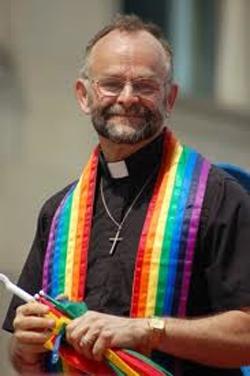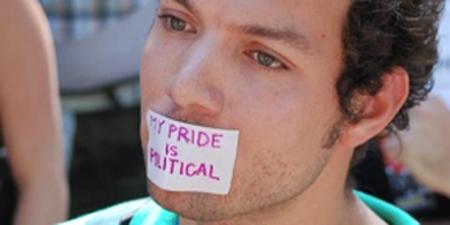The upcoming Pride Panel consultations will be a long and arduous process, likely not producing any recommendations until late January, says panel chair Rev Brent Hawkes from the Metropolitan Community Church.
And even then, none of the recommendations the panel produces will be binding on Pride Toronto (PT).
“We are not the Pride board, so we are not there to defend their actions or explain their actions,” he says. “Our job is to listen to what the community wants.”
Beginning Dec 2, there are five public consultations planned, one consultation specifically for the trans community and another specifically geared to the racialized community.
Xtra has asked to live stream all the consultations.
The panel’s mandate is to develop recommendations to ensure Pride promotes freedom of speech, inclusiveness and individual expression, Hawkes says.
The discussion questions, which will be finalized by the panel this Thursday, will ask the community questions like, “What does Pride mean to you? What would you like to see Pride become? And controversial issues like the corporatization of Pride,” he says.
“There’s some issues around entertainment and some concerns surrounding relationships with different community groups, so we will give people context on all the issues before each session,” Hawkes says.
At each two-hour panel session, participants will break up into smaller groups for facilitated discussions that will be recorded by note-takers, he says.
“There they can talk about whatever issues are important to them,” he says.
Everyone will then be presented with a questionnaire to fill out, Hawkes says. Those questions will be finalized this week as well.
There will also be an online survey with more detailed questions on the community advisory website this week, he says. The survey will include questions related to PT’s budget, sponsorship and funding challenges.
“At the public consultations, we are asking, ‘What are your concerns and issues?’” he says. “In the survey we will present the issues identified and then ask for guidance on those specific issues.
“This is the first time our community has done anything like this. When faced with controversial issues, instead of just fighting it out, this is the first time we’ve organized community consultations.”
The Pride Panel came about as part of PT’s June resolution to rescind its censorious ban on the phrase “Israeli apartheid” in this year’s Pride parade. Made up of “LGBTTIQQ2SA leaders and friends,” the panel is to “consult with the community” and make recommendations “regarding Pride Toronto’s ongoing working relationship with the broader LGBTTIQQ2SA communities.”
The list of nine leaders includes several lawyers, a member of the Ontario Human Rights Commission and a staffer at the Toronto Police Service.
The consultations are part of a deal brokered in the days before Pride by Hawkes, lawyer Doug Elliott and 519 Church Street Community Centre executive director Maura Lawless.
Their proposal, approved by the board, first rescinded PT’s ban on the phrase “Israeli apartheid” and then called for a panel of “LGBTTIQQ2SA leaders and friends” to consult with the community and make recommendations on how Pride can support freedom of speech and reconcile with the broader community.
If any community group can’t make it to the public consultation sessions, the panel will go to them through a series of “targeted consultations.”
“I hope the public consultations, the targeted consultations, the Facebook discussion and the online survey start to give us enough information that we start to get a feel for what the community thinks on these issues,” Hawkes says. “Then we can begin to make recommendations to Pride Toronto.”
“We want to reach out to as many different voices as possible,” he says. “Pride is not just the parade. Some groups may have specific issues that they want to address as a community.”
Hawkes did not know how long the targeted consultations will take to complete.
“It depends how many groups want to participate in the consultations,” he says. “It’s a difficult situation. Some folks want us to get this process done as quickly as possible; others want us to consult widely.
“We are trying to move as quickly as we can, but we want to do this right.”
Sounding slightly skeptical, Hawkes says the goal is to have all the consultations done in December and have a report documenting the process and recommendations for PT ready for late January.
“That will be tough, but that’s the goal,” he says. “My guess is we will have the recommendations by late January. But speed isn’t our goal here.
“Plus, the folks appointed to the panel needed to be well-recognized names in the community. And as a result they are all really busy people. We haven’t been able to meet every week, so it’s taken a while to work out all these details.”
Hawkes says he hopes the community remains patient, trusts the panel members and participates in the process.
When the report and recommendations are completed, Hawkes says, the panel will host a public meeting to explain everything to the community.
“Everything, the report and recommendations, will be released to the public,” he says. “Transparency is very important to this process.”
While PT is not legally bound to implement any of the recommendations made by the panel, there is a moral obligation to the community, Hawkes says.
“Pride Toronto’s board will make decisions on which way they want to go,” he says. “Morally, it depends on how good a job we do. If we consult widely, and the recommendations have wide public support, then I think there will be a great deal of pressure on Pride to accept them.
“Over the years Pride has evolved. After the 30th anniversary is a good time to stop and ask if it’s heading in the direction we want.”


 Why you can trust Xtra
Why you can trust Xtra


